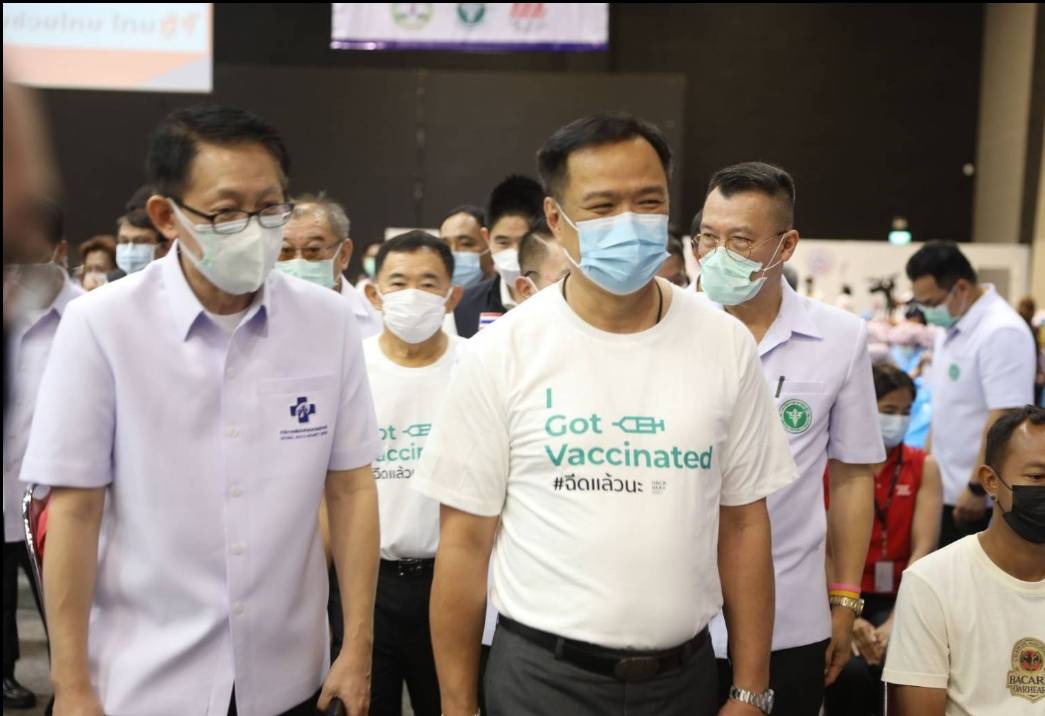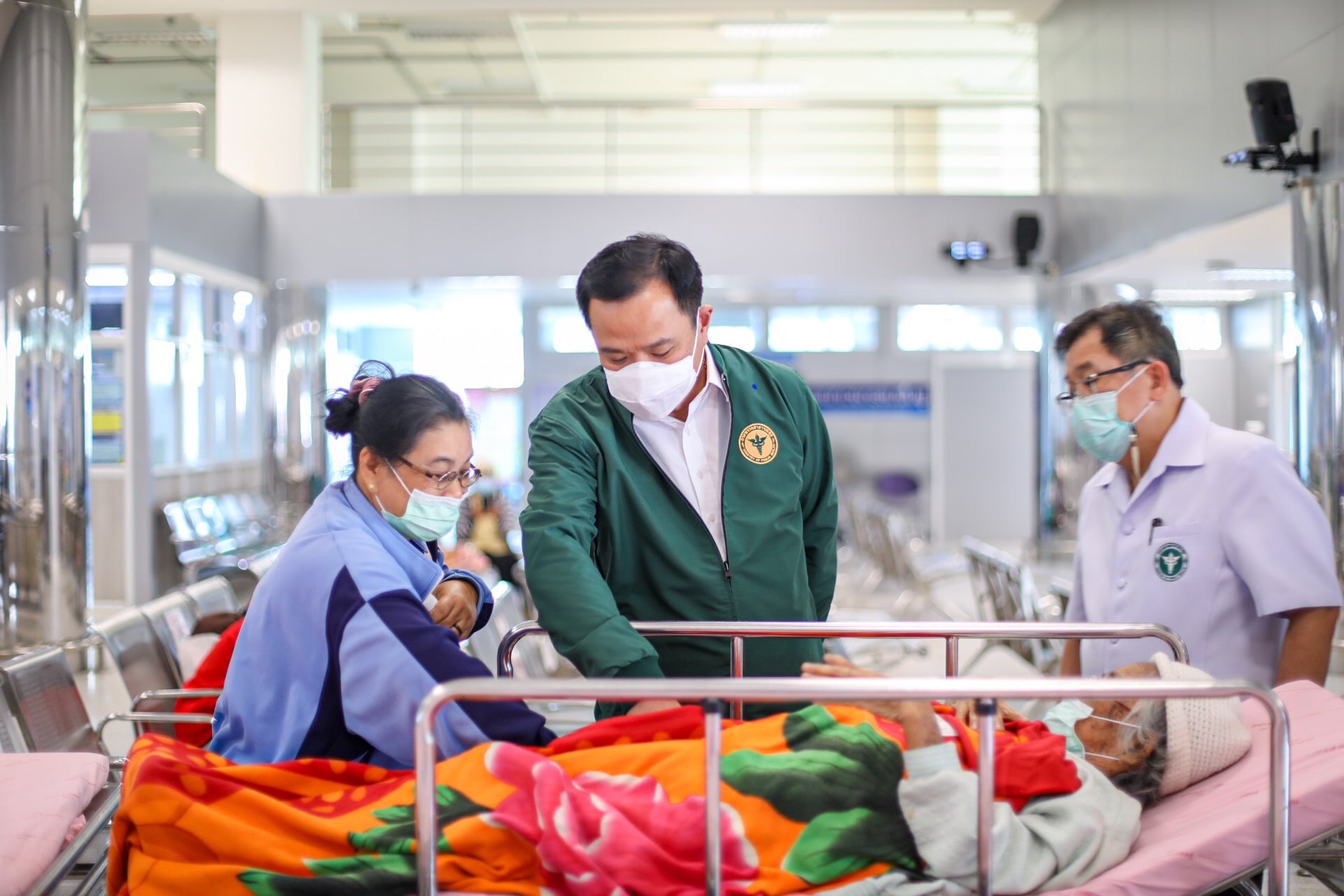
- Home
- DescriptionNews
UCS constantly improves through thick and thin: Anutin

UCS constantly improves through thick and thin: Anutin
A core principle as to why the universal coverage scheme (UCS) has been initiated as a national health security system is that every Thai citizen should have a healthcare right so that no one will literally risk going bankrupt as a result of paying high medical bills.
Some may be covered under the Civil Servant Medical Benefit Scheme (CSMBS) as others are receiving healthcare under the Social Security Scheme (SSS). Those who aren’t members of either the CSMBS or the SSS, meanwhile, are automatically entitled to receiving the healthcare right under the UCS.
Over the past two to three years, the UCS has been encountering a major challenge-- dealing with the COVID-19 crisis while having to continue improving the quality of also non-COVID-19 healthcare services.
Deputy Prime Minister and Minister of Public Health Anutin Charnvirakul has made an interesting point as to how the UCS has so far managed to cope with these enormous difficulties, in his interview on a talk show, Khui Ruang Ban Khui Ruang Muang Khui Thuk Ruang Kap Ratthamontri, which was broadcast on Radio Thailand on June 11, 2022.
He has pointed out that the UCS is the strength of Thailand’s health system and the main reason why the country has survived after outbreak of COVID-19 and successfully minimised the number of deaths claimed by the coronavirus infection.
Thailand’s success in COVID-19 responses and resilience has been recognised internationally, proof of how strong the country’s healthcare system is with the UCS being an essential element of it, said Mr Anutin.
A core work principle behind this notable success was a belief that no one is safe until everyone is safe, which has been adopted by all parties working to contain the spread of the coronavirus and save lives of the patients infected with the virus, he said.
This ideology has also helped curb disparities in access to healthcare as people are treated equally -- disregarding of their financial status -- when receiving treatment and other healthcare services related to COVID-19 infection and prevention, he said.
Dealing with COVID-19 in the past two to three years, the UCS was required to adjust constantly to the changing outbreak situation, he said.
In the beginning, as the government had stepped in to ensure sufficient access to medical treatment for all people infected with the coronavirus all patients were admitted to the hospital for treatment, he said.
However, now that Omicron, the highly transmissible yet less virulent strain has become the dominant variant, there are no need for hospital admissions of non-severe cases, which are now the majority of new infections, he said.
The National Health Security Office (NHSO) has therefore adopted more treatment and care options including home isolation and tele-medicine in order to allow those infected people with no or mild symptoms to stay home and continue as much as possible with their daily life activities, he said.
This way, hospital beds are reserved for the people who suffer severe disease when they are infected with the coronavirus, he said.
As a result, the hospital bed occupancy rate now is less than 20%, while more respirators are available for use in an emergency, he said, adding that this is how the UCS has adjusted to the changing COVID-19 situation.
Aside from the success in managing the COVID-19 crisis, he said, the UCS is also committed to continually improving its services and expanding its benefits package to cover more diseases and treatments.
Since taking office around the middle of 2019, this government has been trying to close the gaps in the country’s healthcare system by improving constantly the UCS’ benefit package such as allowing kidney patients to choose their desired kidney dialysis method, he said.
In the past, only the costs of peritoneal dialysis (PD) and haemodialysis using a dialyzer which was approved by doctors as being necessary were covered under the UCS, he said.
Those whose doctors didn’t approve their request for haemodialysis who insisted on receiving haemodialysis instead of PD had to pay for about 1,500 baht per time of haemodialysis, which normally is required twice or three times a week, he said.
Back then each of such kidney patients had to shoulder the costs of haemodialysis services on their own, which normally cost about 20,000 baht per person per month, he said, adding that that was a large burden on them.

“Before the haemodialysis benefit was added, some doctors working at a kidney dialysis clinic had told me if this specific healthcare benefit wasn’t included soon, there would be a number of patients who would have to die after they ran out of money to pay for their haemodisalysis costs,” said Mr Anutin.
“Upon learning about that, I instantly discussed the matter with the NHSO secretary-general and then proposed for the board of the NHSO to approve it, which they did. I was so glad that they unanimously approved the proposal,” he said.
“From now on, every patient suffering end-stage kidney failure is able to choose his or her desired method of kidney dialysis and receive it free of charge,” he said. “I’m really glad to be a part of this successful attempt to improve the kidney dialysis service, which has added more happiness to the patients and their family.”
The provision of adult diapers to bed-ridden patients is another new benefit added to the UCS’ benefit package recently with an aim to improve the quality of life of the bed-bound patients, mostly the elderly people, he said.
Allowing cancer patients to choose a cancer-treating hospital that best suits their needs is another important benefit added previously under the UCS, which has greatly improved convenience and results of cancer treatment for patients in all parts of the country, he said.
“These are only some examples of new benefits added to the UCS’ core benefit package,” he said.
“I’ve stressed with the NHSO secretary-general that it is very important to assure the people about their health security and make them confident in the healthcare services provided by the government.”
///

